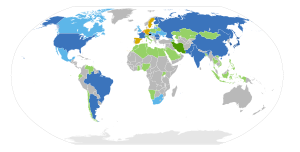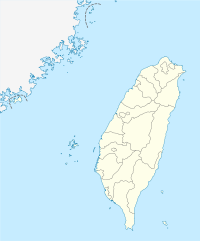- Nuclear power in Taiwan
-
Main article: Energy in Taiwan
Taiwan currently has 4884 MWe of nuclear power capacity by means of 3 active plants and 6 reactors, which makes up around 8.1% of its national energy consumption. This makes Taiwan the 15th largest user of nuclear power in the world.
The technology chosen for the reactors has been General Electric BWR technology for 2 plants and Westinghouse PWR technology for the Maanshan Nuclear Power Plant. The Lungmen Nuclear Power Plant is currently under construction, but has encountered a host of delays building its ABWRs, which will be the largest plants in Taiwan by a large margin after finished.
On World Environment Day in June 2011, environmental groups demonstrated against Taiwan's nuclear power policy. They protested against the nation’s three operating nuclear power plants and the construction of a fourth plant.[1]
Contents
Organization
All plants are run by Taipower. The Atomic Energy Council (AEC) of the Republic of China is effectively the regulatory body, but plants are also subject to International Atomic Energy Agency safeguards. There are two additional plants under construction equipped with GE latest BWR technology in Lungmen. They will each deliver 1300 MWe of power at peak.
Post-Fukushima
Following the Fukushima I nuclear accidents in Japan, nuclear energy has emerged as a contentious issue.[2] In March 2011, around 2,000 anti-nuclear protesters demonstrated in Taiwan for an immediate halt to the construction of the island's fourth nuclear power plant. The protesters were also opposed to plans to extend the lifespan of three existing nuclear plants.[3]
On the eve of World Environment Day in June 2011, environmental groups demonstrated against Taiwan's nuclear power policy. The Taiwan Environmental Protection Union, together with 13 environmental groups and legislators, gathered in Taipei with banners that read: "I love Taiwan, not nuclear disasters".[1] They protested against the nation’s three operating nuclear power plants and the construction of a fourth plant. They also called for "all nuclear power plants to be thoroughly re-evaluated and shut down immediately if they fail to pass safety inspections".
According to Wang To-far, economics professor at National Taipei University, "if a level-seven nuclear crisis were to happen in Taiwan, it would destroy the nation".[1] George Hsu, a professor of applied economics at National Chung Hsing University in central Taiwan, said nuclear power plants in quake-prone areas need to be redesigned to make them more resistant, an investment that would reduce their original cost advantage.[4]
References
- ^ a b c Lee I-Chia (June 5, 2011). "Conservationists protest against nuclear policies". Tapai Times. http://www.taipeitimes.com/News/taiwan/archives/2011/06/05/2003505021.
- ^ Jou Ying-cheng (March 29, 2011). "Cold comfort for anti-nuclear Taiwanese". Asia Times. http://www.atimes.com/atimes/China/MC29Ad02.html.
- ^ "Over 2,000 rally against nuclear plants in Taiwan". AFP. March 20, 2011. http://www.asiaone.com/News/Latest+News/Asia/Story/A1Story20110320-269104.html.
- ^ Yu-huay Sun (April 13, 2011). "Quake-Prone Taiwan Halts Nuclear Expansion as Japan Struggles at Fukushima". Bloomberg. http://www.bloomberg.com/news/2011-04-12/taiwan-halts-plans-to-build-atomic-reactors-after-japan-crisis.html.
See also
Bibliography
Nuclear power by country GWe > 10 Canada · China · EU (France · Germany · United Kingdom) · Japan · Russia · South Korea · Ukraine · United States
GWe > 2 EU (Belgium · Czech Republic · Finland · Spain · Sweden) · India · Republic of China (Taiwan) · SwitzerlandGWe > 1 GWe < 1 Planned Phasing-out Opposed Categories:- Nuclear energy in Taiwan
- Nuclear power by country
Wikimedia Foundation. 2010.

